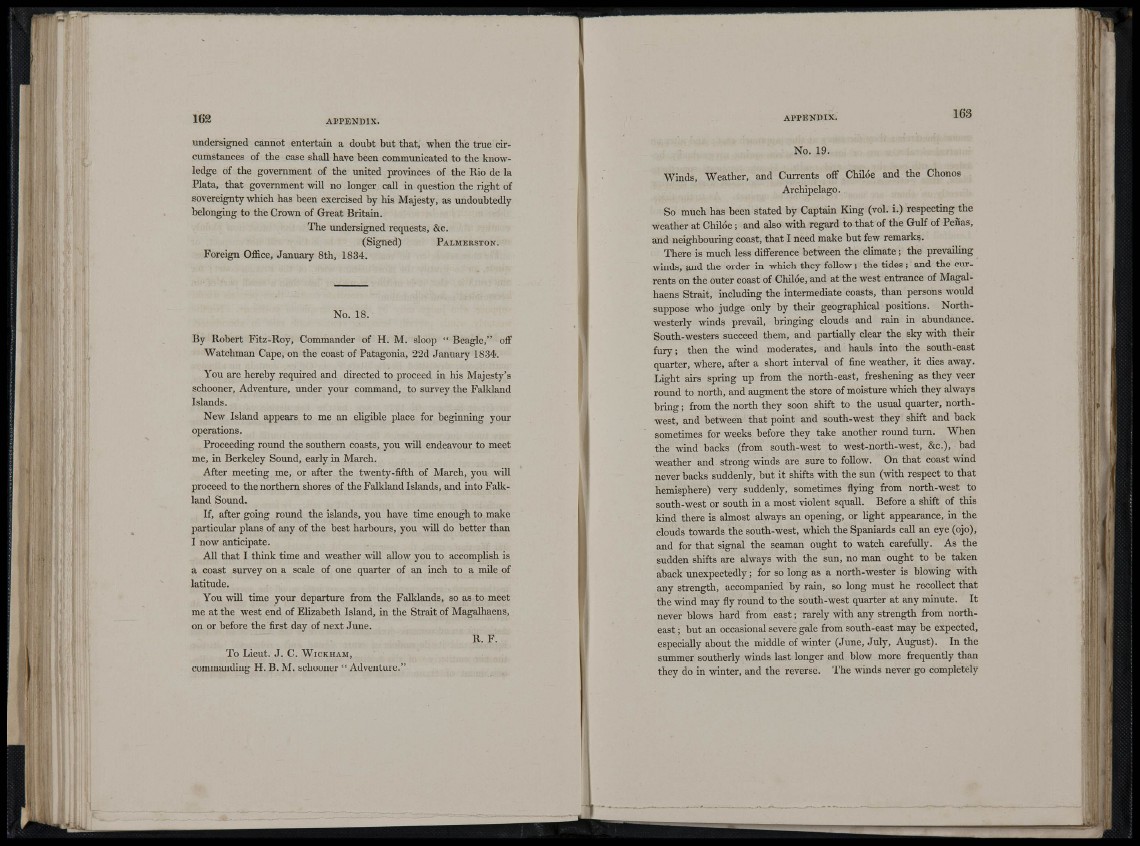
i 111,
í i' •
i I
162 APPENDIX.
undersigned cannot entertain a doubt but that, when the true circumstances
of the case shall have been comnmnicated to the knowledge
of the government of the united provinces of the Rio dc la
Plata, tliat government will no longer call in question the right of
sovereignty which has been exercised by his Majesty, as undoubtedly
belonging to the Crown of Great Britain.
The undersigned requests, &c.
(Signed) Paimekston.
Foreign Office, January 8th, 1834.
No. 18.
By Robert Fitz-Roy, Commander of H. M. sloop " Beagle," off
Watchman Cape, on the coast of Patagonia, 22d January 1834.
You are hereby required and directed to proceed in his Majesty's
schooner, Adventure, under your command, to survey the Falldand
Islands.
New Island appears to me an eligible place for beginning your
operations.
Proceeding round the southern coasts, you will endeavour to meet
me, in Berkeley Sound, early in March.
After meeting me, or after the twenty-fifth of March, you will
proceed to the northern shores of the Falkland Islands, and into Falkland
Sound.
If, after going round the Islands, you have time enough to make
particular plans of any of the best harbours, you will do better than
I now anticipate.
All that I think time and weather will allow you to accomphsh is
a coast survey on a scale of one quarter of an inch to a mile of
latitude.
You wiU time your departure from the Falklands, so as to meet
me at the west end of Elizabeth Island, in the Strait of Magalhaens,
on or before the first day of next June.
R. F.
To Lieut. J. C. WicKHAM,
commanding H. B. M. schooner " Adventure."
A P P E N D I X . 163
No. 19.
Winds, Weather, and Currents off Chiloe and the Chonos
Archipelago.
So much has been stated by Captain King (vol. i.) respecting the
weather at Chiloe; and also with regard to that of the Gulf of Peñas,
and neighbouring coast, that I need make but few remarks.
There is much less difference between the climate ; the prevailing
winds, and the order in which they follow; the tides ; and the currents
on the outer coast of Chilóe, and at the west entrance of Magalhaens
Strait, including the intermediate coasts, than persons would
suppose who judge only by their geographical positions. Northwesterly
winds prevail, bringing clouds and rain in abundance.
South-westers succeed them, and partially clear the sky with their
fury; then the wind moderates, and hauls into the south-east
quarter, where, after a short interval of fine weather, it dies away.
Light airs sprmg up from the north-east, freshening as they veer
round to north, and augment the store of moisture which they always
brmg; from the north they soon shift to the usual quarter, northwest,
and between that point and south-west they shift and back
sometimes for weeks before they take another round turn. When
the wind backs (from south-west to west-north-west, &c.), bad
weather and strong winds are sure to follow. On that coast wind
never backs suddenly, but It shifts with the sun (with respect to that
hemisphere) very suddenly, sometimes flying from north-west to
south-west or south in a most violent squall. Before a shift of this
kind there is almost always an opening, or light appearance, in the
clouds towards the south-west, which the Spaniards call an eye (ojo),
and for that signal the seaman ought to watch carefully. As the
sudden shifts are always with the sun, no man ought to be taken
aback unexpectedly; for so long a£ a north-wester Is blowing with
any strength, accompanied by rain, so long must he recollect that
the wind may fly round to the south-west quarter at any minute. It
never blows hard from east; rarely mth any strength from northeast
; but an occasional severe gale from south-east may be expected,
especially about the middle of winter (June, July, August). In the
summer southerly wmds last longer and blow more frequently than
they do In winter, and the reverse. The winds never go completely
r